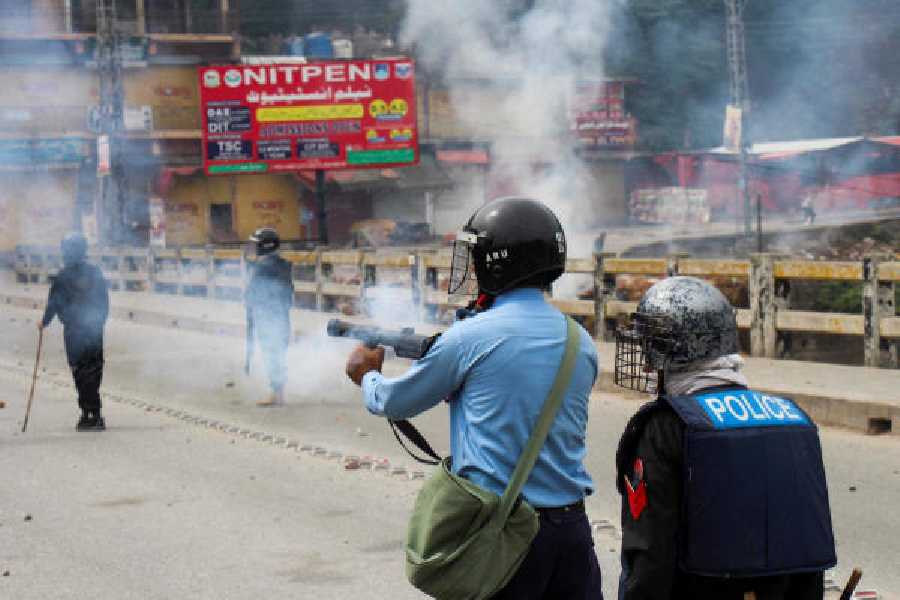Pakistan Prime Minister Shehbaz Sharif has expressed deep concern over violent unrest in the Pakistan-occupied Kashmir (PoK), urging demonstrators to remain peaceful and instructing police to show restraint.
His appeal came after four days of pitched battles in Muzaffarabad, the regional capital, as well as in other smaller cities, left at least nine people dead, including three policemen, and more than 150 injured.
“Peaceful protest is every citizen’s constitutional and democratic right,” Sharif said on Thursday, while warning that public order must not be threatened. He announced financial assistance for victims’ families, a transparent investigation into the violence and the sending of a high-level committee to negotiate with protest leaders.
The turmoil carries weight far beyond Muzaffarabad’s barricaded streets. With the Pakistani military maintaining a large presence, unrest in the area quickly reverberates through national security circles and fuels wider concerns about regional stability.
The effect is felt abroad, too. In Britain, the sizable Kashmiri community staged rallies this week in London and Birmingham.
At home, the anger is driven by familiar frustrations: electricity prices, the privileges of political elites and demands for electoral reform. The Joint Awami Action Committee, a coalition of businessmen, students, lawyers and civil society activists, has channelled that resentment into street demonstrations, shaking the regional administration.
Violence in Muzaffarabad first erupted on Monday, when rival marches by the Action Committee and the pro-government Muslim Conference converged at Neelum Bridge. Police officers fired tear gas and swung batons as protesters hurled stones and raised barricades. Each side accused the other of firing live rounds. A young man was killed in the clashes, and his family’s sit-in has since paralysed traffic in the Chehla Bandi neighbourhood.
Since then, the city has been all but shut down. Shops are shuttered, schools are closed, public transportation has stopped running, and there are shortages of food and medicine. Residents say reaching hospitals or workplaces is a struggle. Internet and phone services, already unreliable in the mountainous region, have largely been cut, leaving families isolated and rumours unchecked.
Security forces, including paramilitary rangers, have ringed government buildings, closing main roads with concrete blocks, shipping containers and barbed wire. Protests have flared in other towns across the region, with fresh clashes erupting whenever demonstrators have torn down police barricades.
Local officials and security personnel have labelled the strikers “miscreants”, accusing them of taking their cues from India. The Action Committee, in turn, accuses state-backed parties and the police of provoking violence to discredit the movement.
Either way, the clashes have spotlighted the committee’s staying power. Its ability to mobilise thousands across social classes presents the most serious challenge in years to the authorities.
Danish Khan, an assistant professor of economics at Franklin & Marshall College in Pennsylvania, said the uprising in PoK was being led not by traditional political parties but by village and bazaar committees.
“Job-starved young people are steering the rallies because they see no future at home,” Khan said. The region’s disputed status, he added, gives locals more space than Pakistanis elsewhere to express political dissent. “People are pushing to tear down an exploitative system and build something that offers work, dignity, and a real voice in their lives.”
Decades of unkept promises and stalled electoral overhauls have bred deep scepticism toward local politicians. Protesters insist they will not stand down unless there is real action to end elite privileges and improve the territory’s governance. A key sticking point for protesters is the allocation of Assembly seats to representatives from outside the region. Protest leaders say that these positions are often leveraged by political actors in Pakistan to influence or unseat local governments.
Last year, protests by the same groups also turned deadly.
“We’re seeing protesters beaten and the Internet shut down,” said Mushaal Hussein Malik, a human rights activist and the wife of Yasin Malik, the Kashmiri separatist leader. “What kind of democracy is this? This is a movement for the political and economic rights of the people of Kashmir?”
Malik, based in Islamabad, added in a video message: “Around the world, peaceful movements aren’t crushed like this.”
On Thursday, Pakistan’s interior minister, Mohsin Naqvi, said a few agitators, acting on “enemy directives”, were trying to disrupt peace in the region but would not succeed. Visiting injured police officers at the Pakistan Institute of Medical Sciences, a hospital in Islamabad, Naqvi said peaceful protest was a right but that “no one would be allowed to take the law into their own hands”.
Officials said that 31 Islamabad and 12 Kashmir police officers were being treated in Islamabad.
In Muzaffarabad, Ali Zaman, 29, a shopkeeper, said officials tried to dismiss the protests as India-backed. “But in reality, these are people who are simply fed up with the system and want change. If our rights aren’t granted, we won’t back down. We want a government that actually represents us.”
New York Times News Service











